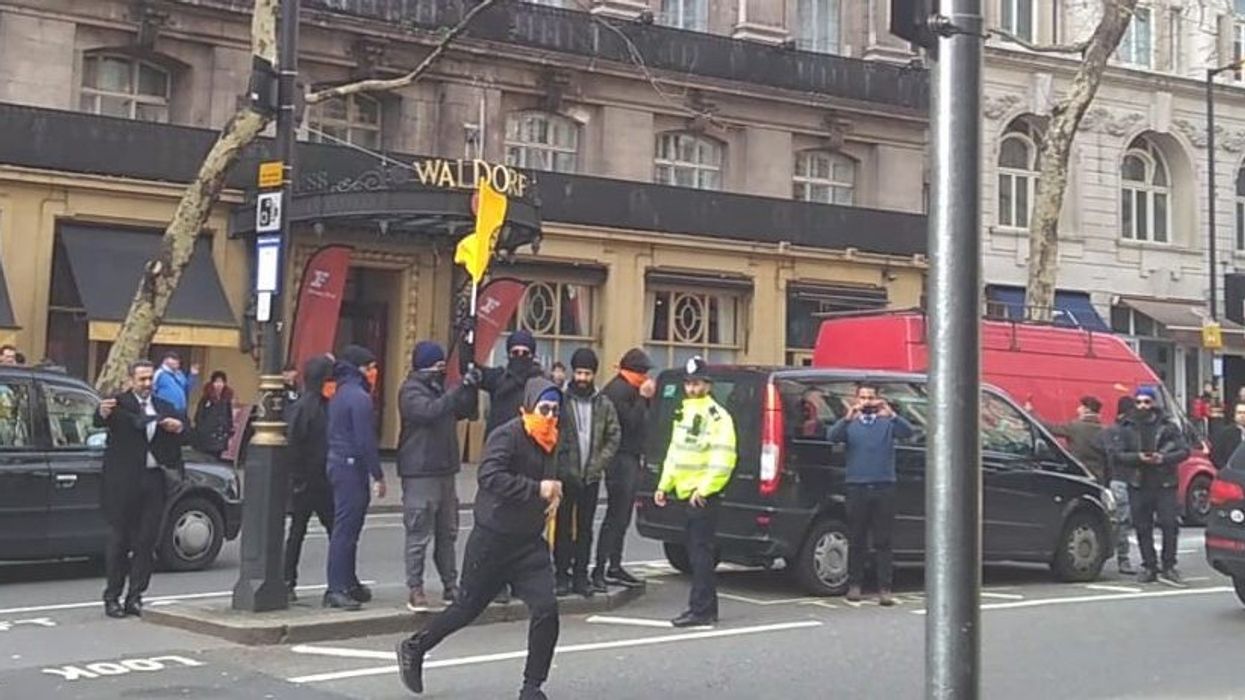Nationalist movements within the British Asian community have become more prevalent in recent years and could “destabilise British society”, a major independent faith review in the UK has stated.
The report by the government’s faith adviser, Colin Bloom, added that the change can be seen in small mobilisation of Hindu nationalist activists who reportedly targeted public figures and politicians they considered hostile to their agenda in the 2019 UK general election, and the recent tensions in Leicester in September 2022.
"In contrast to earlier generations of British Hindus, it appears a small minority are now becoming more passionate about their identification with Hindu political interests in India. While this has rarely led to obvious coercive or violent activity, some British Hindus have expressed frustration with Hindu nationalist involvement in UK politics, which can create division within Indian communities in the UK," said Bloom in the review, commissioned by then prime minister Boris Johnson in 2019.
"While many faith communities are likely to be interested in regional and geopolitical disputes outside of the UK, government should be attentive to the possibility of nationalist movements exploiting religious rhetoric to incite prejudicial views that may destabilise British society."
Titled ‘Does Government ‘do God’?, the review also warned against the 'subversive, aggressive and sectarian' actions of some pro-Khalistan activists and called for action to ensure such groups are not unwittingly allowed access to the UK’s Parliament.
It highlighted how members of the British Sikh community expressed their growing concern over a small, but extremely vocal group “hijacking” the Sikh faith to push a subversive pro-Khalistan narrative.
“There is a small, extremely vocal and aggressive minority of British Sikhs who can be described as pro-Khalistan extremists, promoting an ethno-nationalist agenda,” the review said.
“Some of these extremists have been known to support and incite violence and intimidation in their ambition to establish an independent state called Khalistan, the physical borders of which are largely shared with specific parts of the Punjab state in India.
“Interestingly, this territorial claim does not include the part of the Punjab located in Pakistan. It is not entirely clear if the motivation for these extremists is faith-based or not,” it noted.
The review specifically called on the All Party Parliamentary Group (APPG) for British Sikhs, chaired by Britain’s first female Sikh MP Preet Kaur Gill and has the first turbaned Sikh MP Tanmanjeet Singh Dhesi as its vice-chair – both from the Labour Party, to ensure such organisations are not able to exert influence in parliamentary affairs.
On Islamist extremism, the review called on the British government for better faith literacy and to 'redouble its efforts to reinforce the distinctions between extremist Islamism and Islam and between Islamist extremists and Muslims'.
The report also called for appropriate registration and regulation of madrassas, which are currently not required to be registered as so-called faith-based 'out-of-school settings'.
According to the review, efforts to stop forced marriages are failing as the unit set up to tackle them is undervalued, under-resourced and overly focused on Muslim families.
“For millions of people, faith and belief informs who they are, what they do and how they interact with their community, creating strong ties that bind our country together," Bloom said.
“As we as a nation continue to become more diverse, so too does the landscape of faith and belief. Our government’s understanding of the role of faith in society must remain both current and alive to its evolutionary changes.
“It must also not shy away from some of the challenges that exist in small pockets within faith communities, from forced and coercive marriages to faith-based extremism, financial exploitation, and child safeguarding. These must not be consigned to the ‘too difficult’ box."
He pointed out that greater understanding of faith in all its diversity will ensure that the UK remains a country that respects, celebrates and understands people of all faiths, beliefs and none.
The review examined engagement with faith in a broad range of public institutions, from the civil service and the Armed Forces, to schools and prisons, and called on the government to bring in a new programme of faith literacy training for all public sector staff, ensuring public servants understand those they are helping
It also urged to increase partnership opportunities with faith groups who are already playing a valuable role in the social fabric of the society.
Bloom noted that a better understanding of faith would also equip government to tackle issues such as forced marriage, radicalisation in prison and faith-based extremism.
“As faith minister I will continue to shine a light on the important work of faith groups across the country, who play such an important role in public life. I welcome this review and thank Colin for his work – we will carefully consider the recommendations and I’ll make it my mission to continue to work closely with those of all faiths," said faith minister Baroness Scott of Bybrook.





